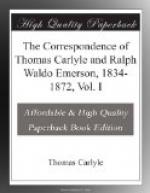I brought a manuscript with me of another curious sort, entitled The Diamond Necklace. Perhaps it will be printed soon as an Article, or even as a separate Booklet,—a queer production, which you shall see. Finally, I am busy, constantly studying with my whole might for a Book on the French Revolution. It is part of my creed that the Only Poetry is History, could we tell it right. This truth (if it prove one) I have not yet got to the limitations of; and shall in no way except by trying it in practice. The story of the Necklace was the first attempt at an experiment.
My sheet is nearly done; and I have still to complain of you for telling me nothing of yourself except that you are in the country. Believe that I want to know much and all. My wife too remembers you with unmixed friendliness; bids me send you her kindest wishes. Understand too that your old bed stands in a new room here, and the old welcome at the door. Surely we shall see you in London one day. Or who knows but Mahomet may go to the mountain? It occasionally rises like a mad prophetic dream in me, that I might end in the Western Woods!
From Germany I get letters, messages, and even visits; but now no tidings, no influences, of moment. Goethe’s Posthumous Works are all published; and Radicalism (poor hungry, yet inevitable Radicalism!) is the order of the day. The like, and even more, from France. Gustave d’Eichthal (did you hear?) has gone over to Greece, and become some kind of Manager under King Otho.*
----------- * Gustave d’Eichthal, whose acquaintance Emerson had made at Rome, and who had given him an introduction to Carlyle, was one of a family of rich Jewish bankers at Paris. He was an ardent follower of Saint-Simon, and an associate of Enfantin. After the dispersion of the Saint-Simonians in 1832, he traveled much, and continued to devote himself to the improvement of society. ----------
Continue to love me, you and my other friends; and as packets sail so swiftly, let me know it frequently. All good be with you!
Most faithfully,
T.
Carlyle
Coleridge, as you doubtless hear, is gone. How great a Possibility, how small a realized Result! They are delivering Orations about him, and emitting other kinds of froth, ut mos est. What hurt can it do?




